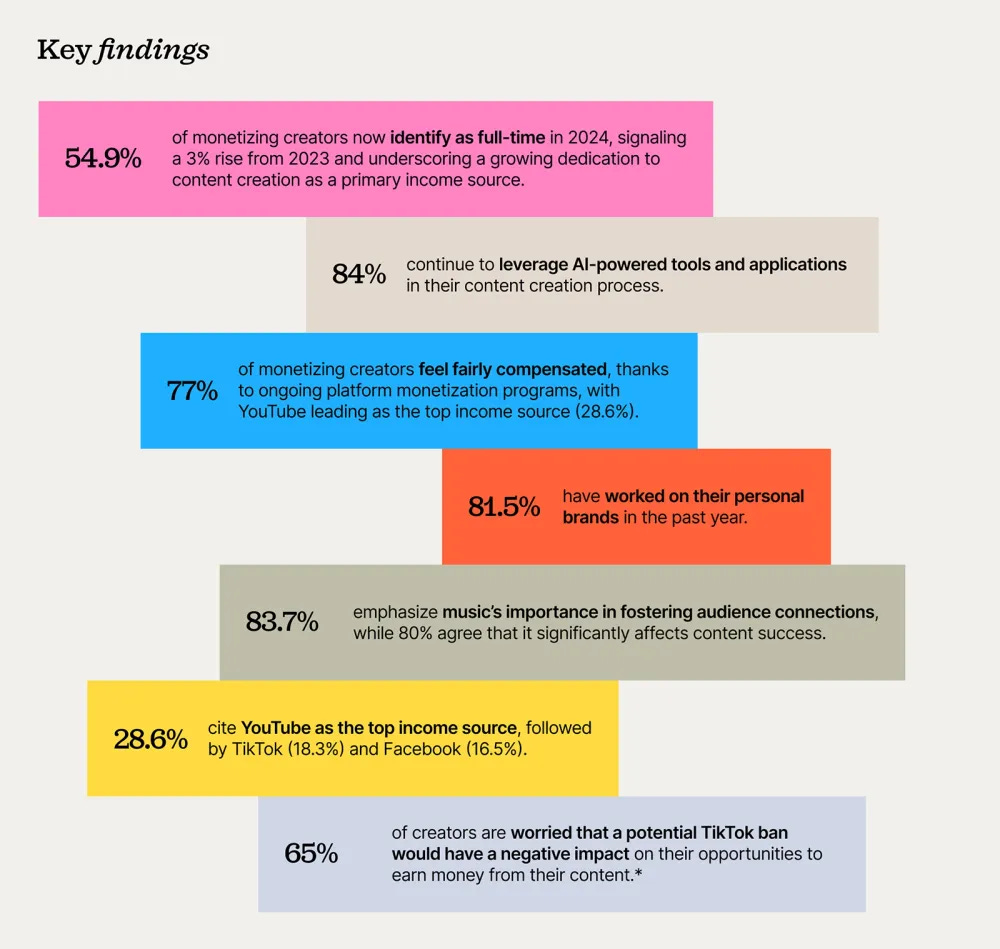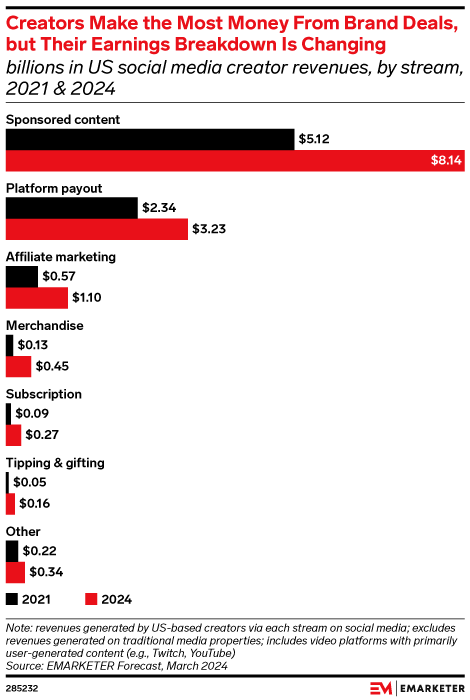✘ What's up, Creator Economy?
- Spectogram QR codes - Magic, Online! - No song is an island - Why fan-first platforms don't work
There’s a lot of noise around the creator economy recently. It’s a part of our digital world that seems to keep growing. I write a lot about musicians within the creator economy, so let’s check in how things are going and what artists can take away from this.
First, let’s look at Epidemic Sound’s Future of the Creator Economy report. Their key findings show that creators are doing pretty good overall - and that music plays a large role in keeping viewers locked to endless scrolls.
Of course, this is all quite generic. YouTube may be the best platform to earn money from this year, but what’s the different revenue pillars that a creator builds their business around? They put forward the following main methods of monetization:
Livestreaming is at the top. But let’s look at those brand sponsorships and affiliate marketing pillars. There’s a lot of differences between creators when it comes to these two. Jaime Ding recently put it succinctly when it comes to the way brands look to influencers these days:
“Companies are learning to look at metrics such as community engagement over number of followers, and they’re scrutinizing the type of relationships creators have with their audience.”
Musicians tend to have fairly niche audiences. A different way of talking about smaller or mid-tier creators. However, there’s a lot of trust in those communities and that could be very valuable to a brand. What’s important here is to know the brand you are as an artist. Something that Water & Music also highlights in their Starter Pack on Music and Brand Partnerships.
Okay, so there’s a few big revenue pillars here. eMarketer, however, has a more thorough breakdown of the various revenue sources of creators and the way they developed over the last few years.
First, tipping is strikingly low here, which shows that even in streaming, brand deals are top. What this means for a musician, artist, or band wanting in on the opportunities of the creator economy is that they need those brand deals. Without them, there’s little to no revenue to be made.
What’s your brand?
The creator economy continues to grow and expand. There’s a few winners, of course (hello Mr. Beast). But let’s be honest, those winners are more like traditional TV than an influencer. Especially when it comes to music, the big-hitting YouTube channels are mostly kids-focused or have music at their core - especially in India. There’s a lot of space for more niche creators to strike. However, there’s also a risk of being squeezed out as platforms onboard more and more creators, and AI tools make it increasingly easy to churn out the necessary content.
One benefit musicians can have is that they would add any creator revenue to diversify their income streams. They can still record, earn from royalties, do sync deals, go on tour, etc. Another benefit, is that they may have an easy connection to certain brands - by virtue of already using it in their music production set up, for example.
So while the creator economy continues to expand, we see earning models diversify for creators. Since most musicians are already active in the social media platforms that creators utilize, it could be a logical step to dig into creator economy revenue models. But with brand partnerships the main revenue driver, artists will need to know their own brand and work on pitching their niche influence.
LINKS
👻 Rock band’s hidden hacking-themed website gets hacked (Lorenzo Franceschi-Bicchierai)
“Kovacs opened the song in the audio-editing app Audacity and, as he suspected, there was indeed a spectrogram — essentially a visual representation of the audio itself — which was actually a scannable QR code. Excited, Kovacs shared his findings on the Bring Me the Horizon’s subreddit.”
✘ Strong Year Zero vibes here, and I’m all here for it.
🐇 Magic, Online! (Nick Susi)
“As each new innovation cycle becomes faster and more frequent, it could mean each period of magical thinking will blur and overlap with the next. As more people see others adopt magical thinking, social proof tells us that it could grow into a mass sociogenic illness that’s culturally normative to a group and a period of time – an epidemic of collective delusion.”
✘ Read this and you’ll understand our current situation better. Nick helps you think about how we deal with new technologies coming into our lives. What’s more, you’ll be left with a better understanding of what skepticism is.
🏝️ No song is an island (Josh Dalton)
“What I’m trying to convey through this nostalgic spiel, is that music is nothing without the listener that embraces it; oft forgotten in a digital world of data, playlists and micro-engagements. With our consumption now so streamlined, it’s all to easy to view The Internet as all an-encompassing beast, yet the heart, the play-count or the Instagram story share, only reveals a snippet of the personal connection forged between listener and song. Behind every recording, a story; and behind every individual listen, a trench of memories, sprawling forever, like an adamantine spiders web.”
✘ Through a personal story, Josh makes very clear what it means to actually connect to a piece of music. What happens when you truly listen and engage?
⛔ The state of the attention economy: why don’t fan-first platforms work? (Hanna Kahlert)
“For music, fan-first platforms often offer hope for solutions. By connecting true fans to their favourite creators in a dedicated space, it is easier to tap into the power of community, enhance the relationship with the artist, and encourage higher spend – be it on tickets, merch, or simply patronage (e.g., through Patreon). From big hubs (like groups on Whatsapp, Discord channels, Snapchat, YouTube, TikTok, Facebook, Instagram, and X) to more specific platforms (such as Bandcamp, Fangage, Monad.Social, With the Band, Fave, EVEN, Amino) the list of places to be is now seemingly endless. And herein lies the problem.”
✘ Hanna makes it clear how talking about ‘superfans’ means we go to niche, kind of as a response to going too broad with streaming. Is there a happy middle? Can one app service both lean-in and lean-back listening and consumption? Or, are we forever wedded to having to keep up with one artist across different platforms? If we look at this piece, and my own above, the answer to that last question is probably: yes.
MUSIC
Today’s recommendation is something quite different. Flamenco combined with Delta Blues. It sounds magical, it sounds like it would be the soundtrack to an exciting, dark film or series. It’s headphone material. The theme of songs is strong, too, focusing on songs about loss, death, and more. Pedro de Dios and Antonio Fernandez have made an album I’ll return to a lot.







Thank you, great post!